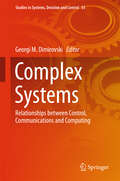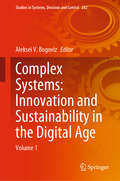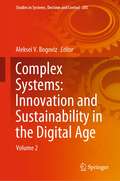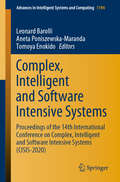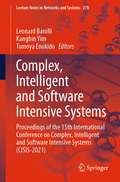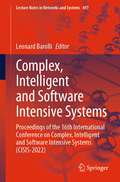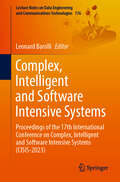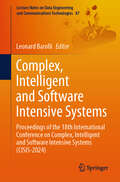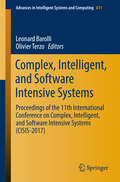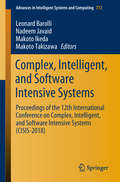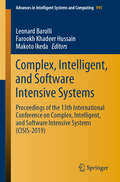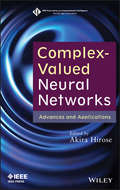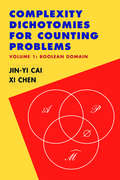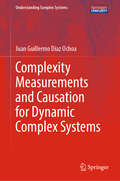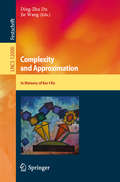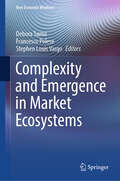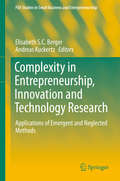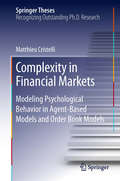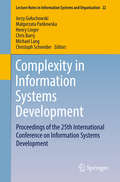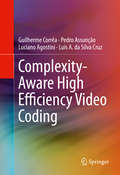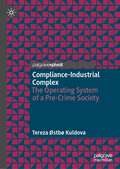- Table View
- List View
Complex Systems: Relationships between Control, Communications and Computing (Studies in Systems, Decision and Control #55)
by Georgi M. DimirovskiThis book gives a wide-ranging description of the many facets of complex dynamic networks and systems within an infrastructure provided by integrated control and supervision: envisioning, design, experimental exploration, and implementation. The theoretical contributions and the case studies presented can reach control goals beyond those of stabilization and output regulation or even of adaptive control. Reporting on work of the Control of Complex Systems (COSY) research program, Complex Systems follows from and expands upon an earlier collection: Control of Complex Systems by introducing novel theoretical techniques for hard-to-control networks and systems. The major common feature of all the superficially diverse contributions encompassed by this book is that of spotting and exploiting possible areas of mutual reinforcement between control, computing and communications. These help readers to achieve not only robust stable plant system operation but also properties such as collective adaptivity, integrity and survivability at the same time retaining desired performance quality. Applications in the individual chapters are drawn from: * the general implementation of model-based diagnosis and systems engineering in medical technology, in communication, and in power and airport networks; * the creation of biologically inspired control brains and safety-critical human-machine systems, * process-industrial uses; * biped robots; * large space structures and unmanned aerial vehicles; and * precision servomechanisms and other advanced technologies. Complex Systems provides researchers from engineering, applied mathematics and computer science backgrounds with innovative theoretical and practical insights into the state-of-the-art of complex networks and systems research. It employs physical implementations and extensive computer simulations. Graduate students specializing in complex-systems
Complex Systems: Solutions and Challenges in Economics, Management and Engineering
by Janusz Kacprzyk Yuriy Kondratenko Christian Berger-Vachon Anna María Gil Lafuente José M. Merigó Carlo Francesco MorabitoThis book presents an authoritative collection of contributions reporting on fuzzy logic and decision theory, together with applications and case studies in economics and management science. Dedicated to Professor Jaume Gil Aluja in recognition of his pioneering work, the book reports on theories, methods and new challenges, thus offering not only a timely reference guide but also a source of new ideas and inspirations for graduate students and researchers alike.
Complex Systems: Volume 1 (Studies in Systems, Decision and Control #282)
by Aleksei V. BogovizThis text provides one of the first book-length studies on the innovative and sustainable development of complex systems in the era of digital transformations, combining quantitative data from several countries with detailed qualitative accounts at the national level. In particular, the book covers the basic concepts, methods, and cutting-edge research on innovation and sustainability in complex systems. Given its scope, the book will be of great interest and value to researchers and practitioners working across the social sciences and in a diverse range of areas in complexity science. Pursuing a multidisciplinary approach, the book is also an ideal resource for advanced undergraduate and graduate level courses in complexity science, sustainability research, economics, and development studies.
Complex Systems: Volume 2 (Studies in Systems, Decision and Control #283)
by Aleksei V. BogovizThis book provides a coherent framework for understanding the essence of complex systems and the nature of digital transformations, analyzes challenges of and patterns in innovative development, and shares a wealth of insights and best practices, resulting in the most extensive coverage of the topic available.In particular, the book’s cutting-edge contributions, prepared by scientists, engineers, and field experts,focus on the design, implementation, and evaluation of practical interventions that promote the innovative and sustainable development of complex systems. In addition to sharing a rich collection of cases from around the world, they provide a broad interdisciplinary analysis of collaboration mechanisms, theories and approaches to support and accelerate the development of complex systems.
Complex, Intelligent and Software Intensive Systems: Proceedings of the 14th International Conference on Complex, Intelligent and Software Intensive Systems (CISIS-2020) (Advances in Intelligent Systems and Computing #1194)
by Leonard Barolli Tomoya Enokido Aneta Poniszewska-MarandaThis book explores three interwoven and challenging areas of research and development for future ICT-enabled applications: software intensive systems, complex systems and intelligent systems. Software intensive systems are systems that extensively interact with other systems, sensors, actuators, devices and users. More and more domains are now employing software intensive systems, e.g. the automotive sector, telecommunication systems, embedded systems in general, industrial automation systems and business applications. Moreover, the outcome of web services offers a new platform for enabling software intensive systems. Complex systems research is focused on the overall understanding of systems rather than their components. Complex systems are very much characterized by the changing environments in which they operate through their multiple internal and external interactions. They evolve and adapt through (internal and external) dynamic interactions. The development of intelligent systems and agents, which is increasingly characterized by the use of ontologies, can be beneficial for software intensive systems and complex systems alike. Accordingly, recent research in the areas of intelligent systems, robotics, neuroscience, artificial intelligence, and the cognitive sciences is essential to the future development of software intensive and complex systems.
Complex, Intelligent and Software Intensive Systems: Proceedings of the 15th International Conference on Complex, Intelligent and Software Intensive Systems (CISIS-2021) (Lecture Notes in Networks and Systems #278)
by Leonard Barolli Tomoya Enokido Kangbin YimThis book includes the proceedings of the 15th International Conference on Complex, Intelligent, and Software Intensive Systems, which took place in Asan, Korea, on July 1–3, 2021. Software intensive systems are systems, which heavily interact with other systems, sensors, actuators, devices, and other software systems and users. More and more domains are involved with software intensive systems, e.g., automotive, telecommunication systems, embedded systems in general, industrial automation systems, and business applications. Moreover, the outcome of web services delivers a new platform for enabling software intensive systems. Complex systems research is focused on the overall understanding of systems rather than its components. Complex systems are very much characterized by the changing environments in which they act by their multiple internal and external interactions. They evolve and adapt through internal and external dynamic interactions. The development of intelligent systems and agents, which is each time more characterized by the use of ontologies and their logical foundations build a fruitful impulse for both software intensive systems and complex systems. Recent research in the field of intelligent systems, robotics, neuroscience, artificial intelligence, and cognitive sciences is very important factor for the future development and innovation of software intensive and complex systems. The aim of the book is to deliver a platform of scientific interaction between the three interwoven challenging areas of research and development of future ICT-enabled applications: Software intensive systems, complex systems, and intelligent systems.
Complex, Intelligent and Software Intensive Systems: Proceedings of the 16th International Conference on Complex, Intelligent and Software Intensive Systems (CISIS-2022) (Lecture Notes in Networks and Systems #497)
by Leonard BarolliSoftware intensive systems are systems, which heavily interact with other systems, sensors, actuators, devices, other software systems, and users. More and more domains are involved with software intensive systems, e.g., automotive, telecommunication systems, embedded systems in general, industrial automation systems, and business applications. Moreover, the outcome of web services delivers a new platform for enabling software intensive systems. Complex systems research is focused on the overall understanding of systems rather than its components. Complex systems are very much characterized by the changing environments in which they act by their multiple internal and external interactions. They evolve and adapt through internal and external dynamic interactions. The development of intelligent systems and agents, which is each time more characterized by the use of ontologies and their logical foundations, builds a fruitful impulse for both software intensive systems and complex systems. Recent research in the field of intelligent systems, robotics, neuroscience, artificial intelligence, and cognitive sciences is a very important factor for the future development and innovation of software intensive and complex systems. The aim of the book “Complex, Intelligent and Software Intensive Systems” is to deliver a platform of scientific interaction between the three interwoven challenging areas of research and development of future ICT-enabled applications: software intensive systems, complex systems, and intelligent systems.
Complex, Intelligent and Software Intensive Systems: Proceedings of the 17th International Conference on Complex, Intelligent and Software Intensive Systems (CISIS-2023) (Lecture Notes on Data Engineering and Communications Technologies #176)
by Leonard BarolliThis book aims to deliver a platform of scientific interaction between the three interwoven challenging areas of research and development of future ICT-enabled applications: software intensive systems, complex systems and intelligent systems.Software intensive systems are systems, which heavily interact with other systems, sensors, actuators, devices, other software systems and users. More and more domains are involved with software intensive systems, e.g., automotive, telecommunication systems, embedded systems in general, industrial automation systems and business applications. Moreover, the outcome of web services delivers a new platform for enabling software intensive systems.Complex systems research is focused on the overall understanding of systems rather than its components. Complex systems are very much characterized by the changing environments in which they act by their multiple internal and external interactions. They evolve and adapt through internal and external dynamic interactions. The development of intelligent systems and agents, which is each time more characterized by the use of ontologies and their logical foundations, builds a fruitful impulse for both software intensive systems and complex systems. Recent research in the field of intelligent systems, robotics, neuroscience, artificial intelligence and cognitive sciences are very important factor for the future development and innovation of software intensive and complex systems.
Complex, Intelligent and Software Intensive Systems: Proceedings of the 18th International Conference on Complex, Intelligent and Software Intensive Systems (CISIS-2024) (Lecture Notes on Data Engineering and Communications Technologies #87)
by Leonard BarolliSoftware Intensive Systems are systems, which heavily interact with other systems, sensors, actuators, devices, other software systems and users. More and more domains are involved with software intensive systems, e.g. automotive, telecommunication systems, embedded systems in general, industrial automation systems and business applications. Moreover, the outcome of web services delivers a new platform for enabling software intensive systems. Complex Systems research is focused on the overall understanding of systems rather than its components. Complex Systems are very much characterized by the changing environments in which they act by their multiple internal and external interactions. They evolve and adapt through internal and external dynamic interactions. The development of Intelligent Systems and agents, which is each time more characterized by the use of ontologies and their logical foundations build a fruitful impulse for both Software Intensive Systems and Complex Systems. Recent research in the field of intelligent systems, robotics, neuroscience, artificial intelligence, and cognitive sciences are very important factor for the future development and innovation of software intensive and complex systems. The aim of the volume “Complex, Intelligent and Software Intensive Systems” is to deliver a platform of scientific interaction between the three interwoven challenging areas of research and development of future ICT-enabled applications: Software Intensive Systems, Complex systems and Intelligent Systems.
Complex, Intelligent, and Software Intensive Systems: Proceedings of the 11th International Conference on Complex, Intelligent, and Software Intensive Systems (CISIS-2017) (Advances in Intelligent Systems and Computing #611)
by Leonard Barolli Olivier TerzoThis book gathers the proceedings of the 11th International Conference on Complex, Intelligent, and Software Intensive Systems (CISIS-2017), held on June 28-June 30, 2017 in Torino, Italy. Software Intensive Systems are characterized by their intensive interaction with other systems, sensors, actuators, devices, and users. Further, they are now being used in more and more domains, e. g. the automotive sector, telecommunication systems, embedded systems in general, industrial automation systems and business applications. Moreover, the outcome of web services delivers a new platform for enabling software intensive systems. Complex Systems research is focused on the understanding of a system as a whole rather than its components. Complex Systems are very much shaped by the changing environments in which they operate, and by their multiple internal and external interactions. They evolve and adapt through internal and external dynamic interactions. The development of Intelligent Systems and agents, which invariably involves the use of ontologies and their logical foundations, offers a fruitful impulse for both Software Intensive Systems and Complex Systems. Recent research in the fields of intelligent systems, robotics, neuroscience, artificial intelligence, and cognitive sciences is essential to the future development of and innovations in software intensive and complex systems. The aim of the volume "Complex, Intelligent and Software Intensive Systems" is to provide a platform of scientific interaction between the three interwoven and challenging areas of research and development of future Information and Communications Technology (ICT)-enabled applications: Software Intensive Systems, Complex systems and Intelligent Systems.
Complex, Intelligent, and Software Intensive Systems: Proceedings of the 12th International Conference on Complex, Intelligent, and Software Intensive Systems (CISIS-2018) (Advances in Intelligent Systems and Computing #772)
by Makoto Takizawa Leonard Barolli Nadeem Javaid Makoto IkedaThis book provides a platform of scientific interaction between the three challenging and closely linked areas of ICT-enabled-application research and development: software intensive systems, complex systems and intelligent systems. Software intensive systems strongly interact with other systems, sensors, actuators, devices, other software systems and users. More and more domains are using software intensive systems, e.g. automotive and telecommunication systems, embedded systems in general, industrial automation systems and business applications. Moreover, web services offer a new platform for enabling software intensive systems. Complex systems research is focused on the overall understanding of systems rather than their components. Complex systems are characterized by the changing environments in which they interact. They evolve and adapt through internal and external dynamic interactions. The development of intelligent systems and agents, which are increasingly characterized by their use of ontologies and their logical foundations, offer impulses for both software intensive systems and complex systems. Recent research in the field of intelligent systems, robotics, neuroscience, artificial intelligence, and cognitive sciences are vital for the future development and innovation of software intensive and complex systems.
Complex, Intelligent, and Software Intensive Systems: Proceedings of the 13th International Conference on Complex, Intelligent, and Software Intensive Systems (CISIS-2019) (Advances in Intelligent Systems and Computing #993)
by Leonard Barolli Farookh Khadeer Hussain Makoto IkedaThis book presents scientific interactions between the three interwoven and challenging areas of research and development of future ICT-enabled applications: software, complex systems and intelligent systems. Software intensive systems heavily interact with other systems, sensors, actuators, and devices, as well as other software systems and users. More and more domains involve software intensive systems, e.g. automotive, telecommunication systems, embedded systems in general, industrial automation systems and business applications. Moreover, web services offer a new platform for enabling software intensive systems. Complex systems research focuses on understanding overall systems rather than their components. Such systems are characterized by the changing environments in which they act, and they evolve and adapt through internal and external dynamic interactions. The development of intelligent systems and agents features the use of ontologies, and their logical foundations provide a fruitful impulse for both software intensive systems and complex systems. Research in the field of intelligent systems, robotics, neuroscience, artificial intelligence, and cognitive sciences is a vital factor in the future development and innovation of software intensive and complex systems.
Complex-Valued Neural Networks: Advances and Applications (IEEE Press Series on Computational Intelligence #18)
by Akira HirosePresents the latest advances in complex-valued neural networks by demonstrating the theory in a wide range of applications Complex-valued neural networks is a rapidly developing neural network framework that utilizes complex arithmetic, exhibiting specific characteristics in its learning, self-organizing, and processing dynamics. They are highly suitable for processing complex amplitude, composed of amplitude and phase, which is one of the core concepts in physical systems to deal with electromagnetic, light, sonic/ultrasonic waves as well as quantum waves, namely, electron and superconducting waves. This fact is a critical advantage in practical applications in diverse fields of engineering, where signals are routinely analyzed and processed in time/space, frequency, and phase domains. Complex-Valued Neural Networks: Advances and Applications covers cutting-edge topics and applications surrounding this timely subject. Demonstrating advanced theories with a wide range of applications, including communication systems, image processing systems, and brain-computer interfaces, this text offers comprehensive coverage of: Conventional complex-valued neural networks Quaternionic neural networks Clifford-algebraic neural networks Presented by international experts in the field, Complex-Valued Neural Networks: Advances and Applications is ideal for advanced-level computational intelligence theorists, electromagnetic theorists, and mathematicians interested in computational intelligence, artificial intelligence, machine learning theories, and algorithms.
Complexity Dichotomies for Counting Problems
by Xi Chen Jin-Yi CaiComplexity theory aims to understand and classify computational problems, especially decision problems, according to their inherent complexity. This book uses new techniques to expand the theory for use with counting problems. The authors present dichotomy classifications for broad classes of counting problems in the realm of P and NP. Classifications are proved for partition functions of spin systems, graph homomorphisms, constraint satisfaction problems, and Holant problems. The book assumes minimal prior knowledge of computational complexity theory, developing proof techniques as needed and gradually increasing the generality and abstraction of the theory. This volume presents the theory on the Boolean domain, and includes a thorough presentation of holographic algorithms, culminating in classifications of computational problems studied in exactly solvable models from statistical mechanics.
Complexity Measurements and Causation for Dynamic Complex Systems (Understanding Complex Systems)
by Juan Guillermo Diaz OchoaThis book examines the problems of causal determinism and limited completeness in systems theory. Furthermore, the author analyzes options for complexity measurements that include systems&’ autonomy and variability for causal inference—i.e., the ability to derive causal relationships from data recorded as a function of time. Such complexity measures present limitations in the derivation of absolute causality in complex systems and the recognition of relative and contextual causality, with practical consequences for causal inference and modeling. Finally, the author provides concepts for relative causal determinism. As a result, new ideas are presented to explore the frontiers of systems theory, specifically in relation to biological systems and teleonomy, i.e., evolved biological purposiveness. This book is written for graduate students in physics, biology, medicine, social sciences, economics, and engineering who are seeking new concepts of causal inference applied in systems theory. It is also intended for scientists with an interest in philosophy and philosophers interested in the foundations of systems theory. Additionally, data scientists seeking new methods for the analysis of time series to extract features useful for machine learning will find this book of interest.
Complexity and Approximation: In Memory of Ker-I Ko (Lecture Notes in Computer Science #12000)
by Ding-Zhu Du Jie WangThis Festschrift is in honor of Ker-I Ko, Professor in the Stony Brook University, USA. Ker-I Ko was one of the founding fathers of computational complexity over real numbers and analysis. He and Harvey Friedman devised a theoretical model for real number computations by extending the computation of Turing machines. He contributed significantly to advancing the theory of structural complexity, especially on polynomial-time isomorphism, instance complexity, and relativization of polynomial-time hierarchy. Ker-I also made many contributions to approximation algorithm theory of combinatorial optimization problems. This volume contains 17 contributions in the area of complexity and approximation. Those articles are authored by researchers over the world, including North America, Europe and Asia. Most of them are co-authors, colleagues, friends, and students of Ker-I Ko.
Complexity and Emergence in Market Ecosystems (New Economic Windows)
by Francesco Polese Debora Sarno Stephen Louis VargoThis book delves into the intricacies of transformative processes, focusing particularly on radical and disruptive changes that shape markets, social systems, organizations, cities, and service ecosystems. In a world characterized by turbulence, unpredictability, and complex challenges, managers and marketers are tasked with navigating change and driving progress. Drawing on frameworks, typologies, and insights from diverse theories—including complexity theory, emergence theory, and service-dominant logic—this book equips academics and practitioners with the tools to analyze, understand, and facilitate the transformation of their systems. Rooted in research and discussions from international academic events such as the Naples Forum on Service and the Forum of Markets and Marketing, this book offers invaluable guidance for those seeking to design sustainable transformations in today's dynamic landscape.
Complexity in Entrepreneurship, Innovation and Technology Research: Applications of Emergent and Neglected Methods (FGF Studies in Small Business and Entrepreneurship)
by Andreas Kuckertz Elisabeth S.C. BergerThisvolume discusses the challenge of dealing with complexity in entrepreneurship,innovation and technology research. Businesses as well as entire economies areincreasingly being confronted by widespread complex systems. Fields such asentrepreneurship and innovation cannot ignore this reality, especially withtheir inherent links to diverse research fields and interdisciplinary methods. However, most methods that allow more detailed analyses of complex problems areeither neglected in mainstream research or are, at best, still emerging. Against this backdrop, this book provides a forum for the discussion ofemergent and neglected methods in the context of complexity inentrepreneurship, innovation and technology research, and also acts as aninspiration for academics across related disciplines to engage more incomplexity research.
Complexity in Financial Markets: Modeling Psychological Behavior in Agent-Based Models and Order Book Models (Springer Theses)
by Matthieu CristelliTools and methods from complex systems science can have a considerable impact on the way in which the quantitative assessment of economic and financial issues is approached, as discussed in this thesis. First it is shown that the self-organization of financial markets is a crucial factor in the understanding of their dynamics. In fact, using an agent-based approach, it is argued that financial markets' stylized facts appear only in the self-organized state. Secondly, the thesis points out the potential of so-called big data science for financial market modeling, investigating how web-driven data can yield a picture of market activities: it has been found that web query volumes anticipate trade volumes. As a third achievement, the metrics developed here for country competitiveness and product complexity is groundbreaking in comparison to mainstream theories of economic growth and technological development. A key element in assessing the intangible variables determining the success of countries in the present globalized economy is represented by the diversification of the productive basket of countries. The comparison between the level of complexity of a country's productive system and economic indicators such as the GDP per capita discloses its hidden growth potential.
Complexity in Information Systems Development: Proceedings of the 25th International Conference on Information Systems Development (Lecture Notes in Information Systems and Organisation #22)
by Michael Lang Christoph Schneider Chris Barry Henry Linger Jerzy Gołuchowski Małgorzata PańkowskaThis volume is a collection of papers on emerging concepts, approaches and ideas in information systems research. It examines theoretical and methodological issues related to both information systems development in general and the complexity of information systems as socio-technical systems. The book draws on invited papers selected from the proceedings of the 25th International Conference on Information Systems Development (ISD) held in Katowice, Poland, August 24 - 26, 2016. The invited conference papers were revised and expanded and present research that is focused on context, creativity, and cognition in information systems development. These issues are significant as they provide the basis for organizations to identify new markets, support innovative technology deployment, and enable mobile applications to detect, sense, interpret, and respond to the environment.
Complexity-Aware High Efficiency Video Coding
by Guilherme Corrêa Pedro Assunção Luciano Agostini Luis A. Silva CruzThis book discusses computational complexity of High Efficiency Video Coding (HEVC) encoders with coverage extending from the analysis of HEVC compression efficiency and computational complexity to the reduction and scaling of its encoding complexity. After an introduction to the topic and a review of the state-of-the-art research in the field, the authors provide a detailed analysis of the HEVC encoding tools compression efficiency and computational complexity. Readers will benefit from a set of algorithms for scaling the computational complexity of HEVC encoders, all of which take advantage from the flexibility of the frame partitioning structures allowed by the standard. The authors also provide a set of early termination methods based on data mining and machine learning techniques, which are able to reduce the computational complexity required to find the best frame partitioning structures. The applicability of the proposed methods is finally exemplified with an encoding time control system that employs the best complexity reduction and scaling methods presented throughout the book. The methods presented in this book are especially useful in power-constrained, portable multimedia devices to reduce energy consumption and to extend battery life. They can also be applied to portable and non-portable multimedia devices operating in real time with limited computational resources.
Compliance Management in Financial Industries: A Model-based Business Process and Reporting Perspective (SpringerBriefs in Information Systems)
by Mathias EggertSince the peak of the world financial crisis in 2008, compliance management has gained more and more interest from practice and research. In particular the financial service industry is strongly regulated and has to follow specific laws, standards and guidelines. Considering the steadily increasing number of legal requirements in the design of information systems is a challenge to financial service providers. This book investigates the challenges of compliance management in financial industries and provides solutions for a compliant design of information models. From a business process perspective, an approach is presented that enables the automatic checking of business process models. From a supervisory reporting perspective a modeling technique is presented that allows for modeling regulatory data warehouse requirements as well as its analysis. Besides these two perspectives the author provides insights into the perceived relationship of Information Systems and Law.
Compliance by Design
by Chong EeA must have book for anyone who is looking to develop awareness and deeper insight into IT controls, strategies and techniques to solve compliance challenges!What does 'compliance' mean to you? Is it a burden, a box-ticking exercise, or a way to avoid the penalties of non-compliance? Or do you see the opportunities it presents for your business? In Compliance by Design, Chong Ee will show you how your organisation can benefit from becoming compliant with the relevant national and international standards. You will discover how integrating controls into your processes will improve your security, increase your productivity, save you time and money, and increase your profits. Drawing on personal experience and using up-to-date, practical examples, the book considers the elements and principles of controls, and offers strategies to put them in place. It will show you how to:implement changes that will improve your processes allay fears and overcome resistance from your stakeholders integrate controls into your everyday processes achieve synergy from interconnected processes assess your priorities and handle conflicting objectives analyse and manage risks establish a system of controls that is right for your business manage your technology to make it work for you. Moving away from traditional effortsTraditional efforts in attaining or sustaining IT compliance employ an outside-looking-in approach, characterised by capturing varied compliance requirements and/or frameworks and applying these within the organisation. This book advocates an inside-looking-out approach, emphasising fundamental ideas of good control design as the basis for developing effective and sustainable IT compliance strategies. Tools and techniquesIntended to arm you with the tools and techniques to put in place the right system of internal controls, the focus is on IT controls, but with plenty of references to business and entity controls, too.
Compliance for Green IT: A Pocket Guide
by Alan CalderRising levels of CO2 in the atmosphere are leading to a gradual rise in the temperature of the earth. With the signature of the Kyoto Protocol in 1997, many countries committed themselves to lowering their emissions of greenhouse gases in order to reduce the speed at which climate change is happening. Many organisations are now responding to the issue of climate change by improving their energy efficiency. Public opinion and customer expectations are also encouraging companies to adopt green initiatives. IT represents an important element of your organisation's environmental policy, not only as regards carbon emissions but also in terms of waste disposal. This pocket guide is intended to provide company directors and executives with a brief guide to the regulatory requirements that are driven by the Green Agenda. It offers you an overview of the key legislative initiatives and environmental standards, and includes an examination of carbon trading schemes.
Compliance-Industrial Complex: The Operating System of a Pre-Crime Society
by Tereza Østbø KuldovaThis is the first book to examine the growth and phenomenon of a securitized and criminalized compliance society which relies increasingly on intelligence-led and predictive technologies to control future risks, crimes, and security threats. It articulates the emergence of a ‘compliance-industrial complex’ that synthesizes regulatory capitalism and surveillance capitalism to impose new regimes of power and control, as well as new forms of subjectivity subservient to the ‘operating system’ of a pre-crime society. Looking at compliance beyond frameworks of business management, corporate governance, law, and accounting, it looks as it as a social phenomenon, instrumental in the pluralization and privatization of policing, where the private intelligence, private security, and big tech companies are being concentrated at the very core of compliance, and hence, governance of the social. The critical book draws on transversal, rather than interdisciplinary, approaches and integrates disparate perspectives, inspired by works in critical criminology, critical algorithm studies, critical management studies, as well as social anthropology and philosophy.
